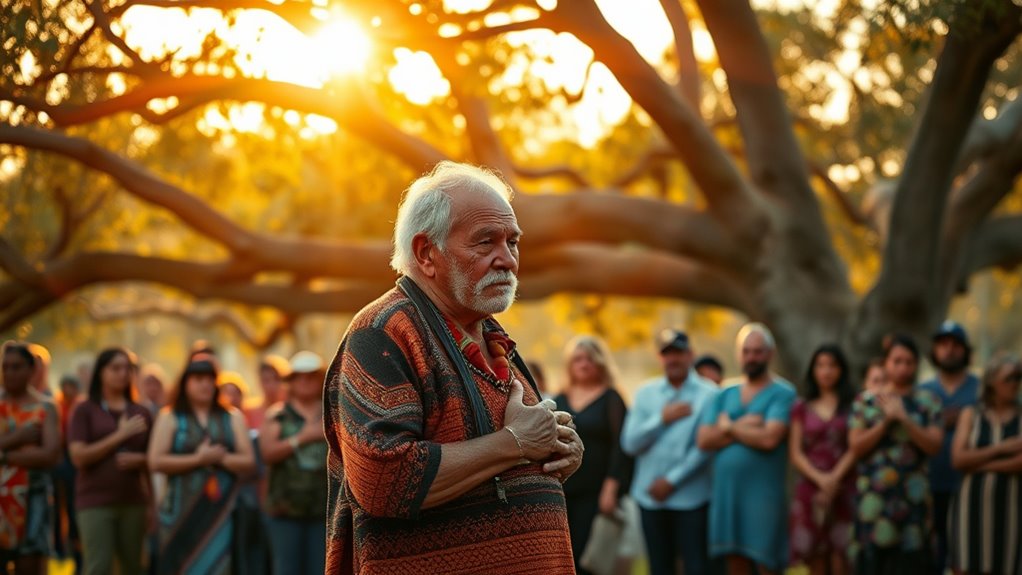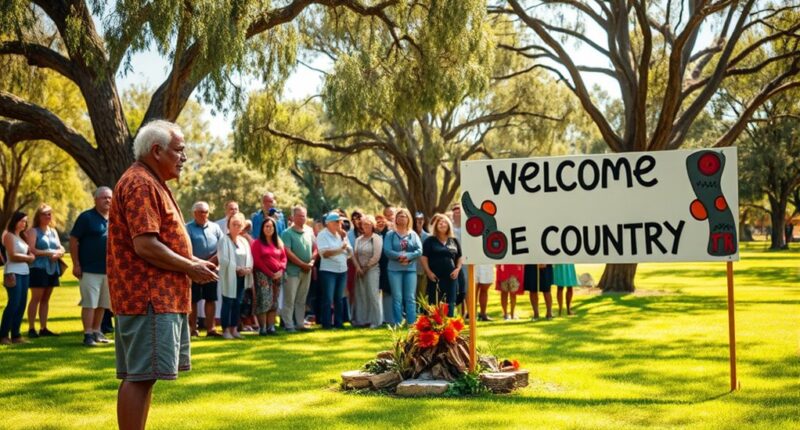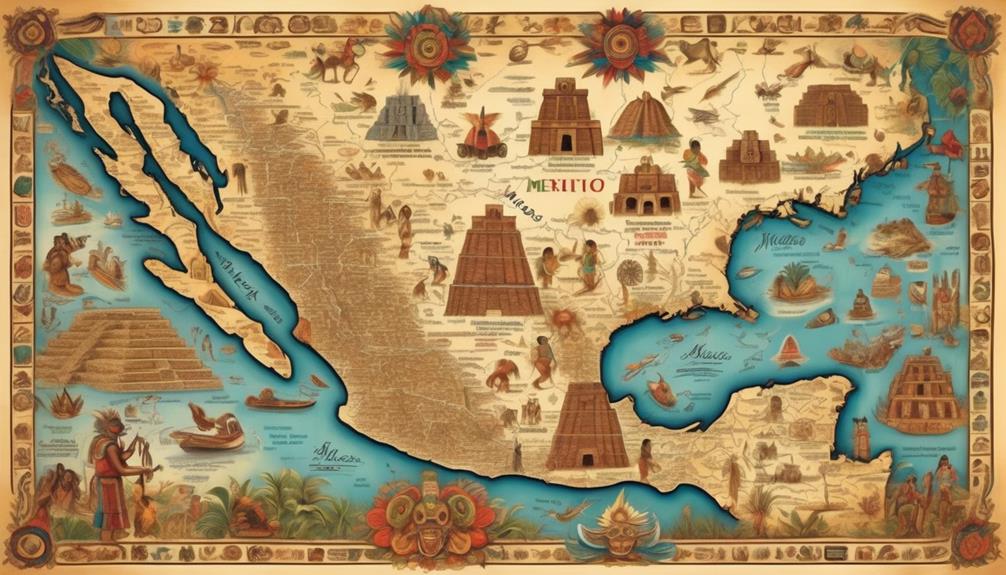A culturally appropriate acknowledgment of country shows respect by recognizing the traditional custodians of the land and their ongoing connection. To do this meaningfully, research local Indigenous groups and their customs beforehand. Use genuine, specific words that honor elders past, present, and emerging, and be mindful of community protocols. Deliver your acknowledgment sincerely and with humility, focusing on building trust and understanding. If you explore further, you’ll discover ways to make your acknowledgment more impactful and respectful.
Key Takeaways
- Research and specify the local Indigenous groups or nations, tailoring your acknowledgment accordingly.
- Include recognition of elders past, present, and emerging to honor leadership and ongoing cultural connection.
- Understand and respect specific cultural protocols for sacred sites and respectful language.
- Deliver the acknowledgment sincerely, authentically, and with humility to foster trust and respect.
- Commit to ongoing relationships, reconciliation, and demonstrating cultural sensitivity beyond a single statement.

A culturally appropriate acknowledgment of country is a respectful way to recognize the traditional custodians of the land where an event or activity takes place. It’s more than just a formal statement; it’s a sign of respect, understanding, and genuine recognition of Indigenous protocols. When you start with a thoughtful acknowledgment, you demonstrate an awareness of the history and ongoing connection Indigenous communities have with the land. This helps foster trust and shows your commitment to honoring their culture and sovereignty.
To make your acknowledgment meaningful, it’s important to understand the significance of respectful recognition. This means going beyond a generic statement and tailoring your words to reflect local Indigenous groups and their unique connection to the land. Doing your research beforehand ensures you’re accurately representing their culture and history. For example, mention the specific nation or language group whose land you’re on, and acknowledge their elders past, present, and emerging. This demonstrates your respect for their traditional knowledge and leadership.
Tailor your acknowledgment by researching local Indigenous groups and honoring their elders’ ongoing leadership.
Following Indigenous protocols involves more than just words. It’s about understanding the cultural customs, practices, and sensitivities associated with giving an acknowledgment. In some communities, there may be specific protocols for entering sacred sites or addressing elders, so it’s vital to familiarize yourself with these practices. If possible, consult local Indigenous leaders or organizations to ensure your acknowledgment aligns with their expectations and cultural norms. This step shows your genuine respect and willingness to learn from the community.
When delivering your acknowledgment, do so sincerely and clearly. Speak with humility and avoid language that could be seen as superficial or performative. Remember, it’s about honoring the connection between the people and their land, not just ticking a box. Your tone should reflect respect and appreciation, emphasizing the importance of ongoing relationships and reconciliation. By doing so, you create a welcoming environment that values Indigenous voices and perspectives.
Incorporating these practices into your event or activity demonstrates your commitment to reconciliation and cultural sensitivity. It shows that you recognize the significance of Indigenous protocols and are dedicated to respectful recognition. Ultimately, a well-crafted acknowledgment can set a positive tone, fostering mutual respect and understanding. It’s a simple yet powerful way to honor the land’s traditional custodians and affirm the importance of their enduring connection to the land. Recognizing the importance of Indigenous protocols and ongoing relationships is essential for authentic engagement.
Frequently Asked Questions
How Do I Choose the Right Indigenous Elder for Acknowledgment?
When choosing the right indigenous elder for acknowledgment, focus on respectful engagement and Elder selection. You should connect with local Indigenous communities or organizations to identify trusted elders. Approach them with sincerity, showing genuine respect for their leadership and cultural knowledge. It’s important to listen carefully, follow community protocols, and guarantee your engagement is culturally appropriate. This respectful process helps build meaningful relationships and ensures proper acknowledgment of their cultural significance.
Can Acknowledgment of Country Be Done Virtually?
Acknowledgment of Country can definitely be done virtually, like casting a net across digital waters to include everyone. With virtual ceremonies, you can honor Indigenous communities through online inclusion, ensuring respect and recognition regardless of location. Just make sure your virtual setup respects cultural protocols, and involve community elders when possible. This way, your acknowledgment remains meaningful, bridging gaps and connecting people across distances in a shared act of respect.
What Are Common Mistakes to Avoid in Acknowledgment?
When giving an acknowledgment, avoid common mistakes like tokenism, which can undermine cultural sensitivity. Don’t rush through it or make it seem superficial; instead, show genuine respect and understanding. Avoid generic or vague statements, and don’t ignore the specific community you’re addressing. Be mindful of your tone and guarantee your acknowledgment is meaningful, sincere, and culturally appropriate, truly respecting the significance of the land and its people.
Is Acknowledgment of Country Legally Required?
Think of acknowledgment of country as the foundation of a building; it’s essential but not always legally mandated. While it holds deep cultural significance, legal obligations vary by location. In some places, it’s a required respectful gesture, whereas in others, it’s encouraged but not compulsory. You should check local laws and organizational policies to understand whether acknowledgment of country is legally required or simply a meaningful act of respect.
How Can Organizations Ensure Respectful Ongoing Relationships?
You can guarantee respectful ongoing relationships by fostering cultural sensitivity and genuine community engagement. This means actively listening to Aboriginal and Torres Strait Islander voices, building trust through consistent communication, and respecting cultural protocols. You should prioritize long-term partnerships over one-off gestures, involve communities in decision-making, and show sincere commitment to reconciliation. By doing so, your organization demonstrates respect and nurtures meaningful, lasting relationships grounded in understanding and mutual respect.
Conclusion
By acknowledging Country, you show respect and build connection, yet it’s more than just words—it’s a bridge to understanding. While the land remains unchanged, your recognition can transform relationships and foster trust. Don’t see it as a mere formality, but as a meaningful act that honors stories and sovereignty. In embracing this practice, you hold the power to create a more inclusive future—where respect for culture isn’t just spoken, but truly lived.









